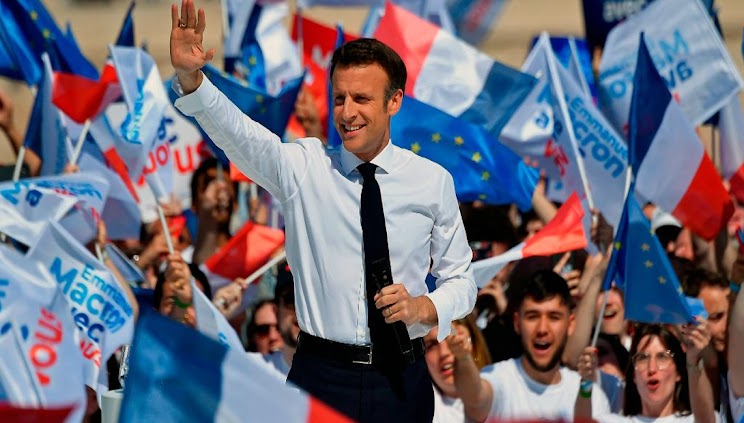 |
| Macron on Election Campaign. Image Credit. |
Projections showed that French President Emmanuel Macron was on track to win a second term by defeating far-right leader Marine Le Pen in presidential elections on Sunday.
According to predictions by polling firms for French television stations based on a sample of the vote count, Macron was predicted to win 57.0-58.5 percent of the vote, while Le Pen received 41.5-43.0 percent.
The margin of victory is less than in their second-round matchup in 2017 when the same two candidates faced off in a run-off and Macron won with nearly 66 percent of the vote.
The reasonably comfortable margin of victory will give Macron some confidence as he begins a second five-year term, but it is also the closest the far-right has ever gone to gaining power in France.
A victory for Le Pen, who has been accused by opponents of having close links with Russian President Vladimir Putin, would have sent shockwaves around the world equal to the 2016 polls that resulted in Brexit in the United Kingdom and Donald Trump's election in the United States.
The result, which is anticipated to be confirmed by official results overnight, would provide enormous comfort in Europe after fears that a Le Pen presidency would leave the continent adrift following Brexit and the resignation of German Chancellor Angela Merkel.
In an unusual statement published in Le Monde newspaper, left-leaning EU officials, notably German Chancellor Olaf Scholz, appealed to France in the run-up to the election to select Macron over his challenger.
Macron will be the first French president to be re-elected since Jacques Chirac in 2002 after Nicolas Sarkozy and Francois Hollande both departed office after only one term.
The 44-year-old is scheduled to deliver a victory speech on the Champ de Mars in central Paris, near the Eiffel Tower, where flag-waving fans exploded in glee when the projections showed at 8:00 p.m. local time (1800 GMT).
Ambitions are high.
After a first term marred by protests, the pandemic, and Russia's invasion of Ukraine, Macron will be hoping for a less problematic second term that will allow him to implement his goal of more pro-business change and tighter EU integration.
However, he will have to win over those who backed his opponents as well as the millions of French who did not vote.
Based on the official numbers, polling firms indicated that the abstention percentage was on track for 28%, which, if verified, would be the highest in any presidential election second-round run-off since 1969.
The first round of voting on April 10 had put Macron, 44, in a strong but not unassailable position to retain the presidency.
Convincing followers of the hard-left third-placed candidate, Jean-Luc Melenchon, to hold their noses and vote for the former investment banker was a top aim for Macron in the campaign's second phase.
Macron will also need to ensure that his party maintains control of a parliamentary majority in legislative elections that follow the presidential election in June, as well as prevent any unpleasant "cohabitation" with a premier who does not share his political views.
Le Pen will have to swallow a bitter pill.
Pension reform, including raising the French retirement age, is high on his priority list, which Macron has stated is necessary for the budget but is sure to face fierce opposition and protests.
He will also have to return from the campaign tour quickly to cope with Russia's onslaught on Ukraine, with pressure on France to increase armament shipments to Kyiv and signals that President Vladimir Putin is losing interest in dialogue.
After years of working to make herself electable and separating her party from the heritage of its founder, her father, Jean-Marie Le Pen, Le Pen's third defeat in presidential polls will be a tough pill to chew.
Critics said her party never stopped being extreme-right and racist, while Macron frequently emphasized her promise to prohibit Muslim headscarves from being worn in public if elected.
She has intimated that this could be her final campaign, and uncertainty about the future of her party and the French far-right, which fractured during the campaign, is anticipated to rise.
When Jean-Marie Le Pen reached the second round of the election in 2002, the result startled France, and he received less than 18 percent of the vote in the subsequent run-off against Chirac.
This story was not edited by Toisthe staff and is published from a syndicated feed, except for the headline.









0 Comments
please do not enter any spam link in the comment box